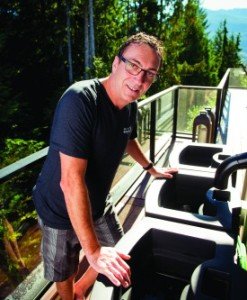By Drew Copeland
Published: Oct 11, 2014
Look in the corners of Thomas Schneider’s home on Buckley Ave. and you will see rain barrels which hold water for his plants. One is next to a fig tree whose branches are full of fruit and another is beneath a grape vine clinging to a trellis.
Thomas Schneider is knowledgeable about permaculture and water retention and the evidence lies in his extensive and flourishing garden.

“It makes sense to harvest what you have. Rainwater is one of the four elements we have from nature and it’s essential to actually grow anything,” said Schneider.
For five years, he has eliminated chemicals from his organic garden—including the chemicals in tap water. Unlike tap water, rainwater is free of chlorine—a chemical that kills bacteria in water, but also beneficial micronutrients in the soil.
For Schneider, collecting rainwater is part of a bigger picture. He built berms on the high side of his property so that rain will drain through the land and plants will have a chance to use it. He also mulches his garden to reduce the amount of water lost from evaporation.
Presently he has a capacity for about 1,200 liters of rain water, not enough to sustain him through the summer dry season. He figures that he would need to up his capacity to 5,000 liters with a cistern, to maximize use of rainwater.
Dr. Tom Honey has been collecting rainwater at this Garibaldi Highlands home since 2010. It provides water for pressure washing his driveway, washing the car and irrigation for a rooftop garden.
“I strongly believe we will need to be more self-reliant in the future,” he says, and using free water for him is one step towards that self-sufficiency.
It costs about $60 to buy a plastic barrel and hardware necessary to build a rain barrel—a little bit more for a classy oak cask. The DOS too realizes the benefits of encouraging residents to preserve water, as such initiatives will reduce burden to infrastructure as well as help reduce flooding.
Come the spring, DOS will be hosting workshops in conjunction with the Climate Action Network (CAN) to educate residents how to make to make a rain barrel and on the importance of rainwater harvesting.
Meg Toom is the water conservation educator for the DOS, a position created in August. She emphasizes the importance of education to curb behaviour. There is an enormous cost attached to pumping the wells and putting it through chlorine and bringing it to the tap.
“We’re trying to connect people to their taps,” she said.


heather gee says
It’s heartening to hear that not everyone wastes water. I hope many home owners attend CAN’s workshop. It’s a great benefit to have your own water to use especially during those hot summer months when we have reduced usage.